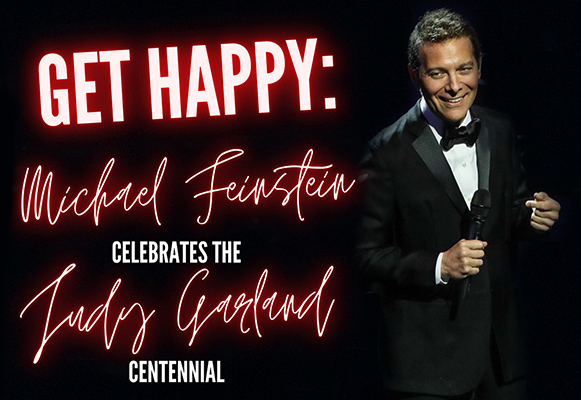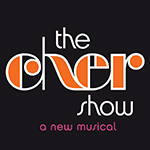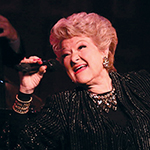Michael Feinstein
Get Happy! Michael Feinstein Celebrates the Judy Garland Centennial
Scottsdale Center for the Performing Arts, Scottsdale, AZ, March 20, 2022
Reviewed by Lynn Timmons Edwards

There are two Michael Feinsteins. The first is the connoisseur at the keyboard who plays the Great American Songbook showing delicate care for the composer’s creation and making his performance all about the song not his singing. Then there is the Feinstein starring in Get Happy! Celebrating the Judy Garland Centennial. He is accompanied by Tedd Firth on piano, David Fink on acoustic bass, and Mark McLean on drums—as fine a trio as any singer could imagine. That Feinstein is a suave, handsome, high-energy entertainer with a baritone voice rivaling the “other Michael,” Mr. Bublé. From the moment he took the stage with an upbeat “Get Happy,” the room buzzed, and the audience knew it was in for a wonderful time.
Get Happy! is a salute to Judy Garland in celebration of her 100th birthday on June 10 of this year. It was created with the blessing of Liza Minnelli who is credited as the Executive Producer. For Feinstein, the show is clearly a love letter. The fine-tuned production is magical, not just because of the band and the lead singer, but also because of the brilliant multimedia backdrop which includes family photos, home movies, stills, and outtakes from Garland’s career in the movies and on stage, put together with original iamges that are perfectly in synch with each song and story. Bravo to its creator.
As part of his introduction, Feinstein sang “That’s Judy Garland,” with parody lyrics written by Jerry Herman to the tune of “That’s Entertainment” (Arthur Schwartz/Howard Dietz). Garland’s story was told chronologically, beginning with her early years in vaudeville as one of the Gumm Sisters and then turning to her time at MGM studios until her dismissal in 1950. Each story built just enough connection between the songs and medleys. Feinstein let us sample all three arrangements of “Zing! Went the Strings of My Heart” (words and music by James Hanley, 1934) which Garland sang throughout the years. He included classics written for her by MGM father figures Roger Edens (“You Made Me Love You” with music by James Monaco), and Arthur Freed (“Singing in the Rain” with music by Nacio Herb Brown). In tribute to The Wizard of Oz, Feinstein the scholar took his seat at the piano for “If I Only Had a Brain/Heart/Nerve,” complete with rarely heard verses. He did not distinguish vocally between the Scarecrow and the Tin Man, but he did use his acting chops for a comic interpretation of the Cowardly Lion.
To highlight both her movies and her lifelong friendship with Mickey Rooney, Feinstein sang a medley of another Edens/Freed song, “Our Love Affair,” and one Freed wrote to the music of Burton Lane, “How About You?” One can read a biography of Judy Garland, but only in Feinstein’s Get Happy can you hear him accompany her when she was 19 years old singing “I’ll Be Seeing You” (Sammy Fain/Irving Kahal). With divine intervention, Feinstein discovered home recordings Garland had made and someone had hidden behind a wall in a house she built for her mother in 1939. One contained her a cappella recording of the song; although it was predictably scratchy due to its age, hearing her pitch-perfect voice while Feinstein played felt like time travel.
Feinstein is a master of a song’s verse, and he included it on many of Garland’s hits. including “On the Atchison, Topeka and the Santa Fe” from The Harvey Girls, “The Trolley Song” from Meet Me in St. Louis,” and the title song from the film “For Me and My Gal.” He performed “It’s a New World” from A Star Is Born, written by Harold Arlen and her dear friend Ira Gershwin. It was woven together with lyrics and media that displayed Garland’s love for her children, Liza Minnelli and Lorna and Joey Luft.
Feinstein picked up the tempo with “Chicago.” His phrasing and charisma remind one of Sinatra at his prime. Little was mentioned about Garland’s struggles with drugs and alcohol. Feinstein presented a dark and solemn moment when he stood at the mic stand and sang “Through the Years” and “You’ll Never Walk Alone,” songs Garland shared with her live audiences. It was her way of wishing them a kinder, gentler world. The finale was Harold Arlen and Johnny Mercer’s “Come Rain or Come Shine.” Garland first recorded it in 1956 and then sang it in 1961 during her legendary performance at Carnegie Hall. The encore was both predictable yet a surprise. Feinstein sat back at the piano to begin “Over the Rainbow,” but then we heard Garland’s voice and saw a video of her standing at the microphone in a 1940s radio studio singing the song in the same key. The two soulmates—one live and one long gone—finished the song in harmony.
Feinstein debuted Get Happy! over two nights at Feinstein’s/54 Below in New York City in December 2021. He brought a tight 90-minute version to Scottsdale for two performances. Kudos to the Scottsdale Center for giving us this musical and historical cabaret gem. It should be recorded and donated to the Library of Congress.





